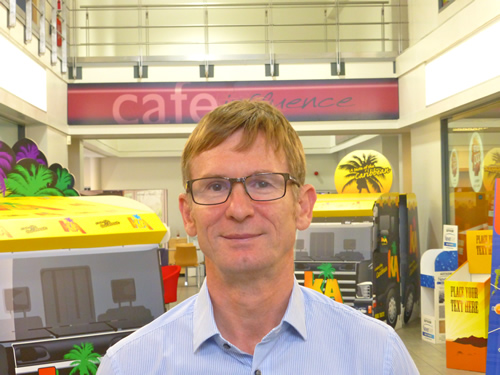For someone who didn’t really want to joint the family print business Mark Simpson has stuck at it longer than his late father and company founder could ever have imagined. It’s 32 years since the man, who since the start of the 1990s been at the helm of the Simpson Group in Washington, Tyne and Wear, first joined what was then Simpson Print.
“Over the last five or six years we’ve been consolidating. We haven’t grown turnover but we’ve increased margins and changed the shape of our customer base. We’ve invested in areas that we think will stand us in good stead to be a specialist retail branding partner to customers who appreciate the value of what we can do for them. So now it’s about leveraging all we’ve put in place and grow the right type of business with the right kind of margin. It’s about developing a new way of doing business and it’s why I’m putting together a new board,” says Simpson.
He explains: “Many people are frightened of change, but I love it. I hate things to stay the same way for too long. I’m restless and impatient and I challenge everything, but it means that while I’m good at starting things I’m not so good at carrying things through to completion. So what is important is to find people who understand your vision and get them into the right positions to help you carry that through.”
At the Simpson Group that means the creation of four new Board positions. Alongside Simpson and the current MD and finance director will be appointed a sales director, business development director, process flow director, and training and development director.
“Although I’ve said I’m not one for carrying things through, I do like detail and I have a good handle on where we make money. It’s easy to become busy fools; I know what jobs and customers are profitable. You can’t do everything that’s thrown at you – you need to monitor your business, do your research and understand where you can provide a customer with value and yet make money. It means you can’t just bring in a senior team and tell them to get on with it; they need time to gain that commercial experience and have power gradually transferred across to them. So that’s the plan.”
The new Board positions say a lot about Simpson’s succession planning and also his vision. Having decided that “specialising in retail branding is the key” he says the group is “looking into any area that can be beneficial to clients.”
He expands: “We want to be more involved in the direction customers are taking. It’s not just about responding to print tenders; no-one’s getting any value there. It’s about targeting specific customers and working out how we can deliver something that makes sense to both sides. It means you have to take a long-term view. We look into customers’ markets, much of which you can do with clever Google searches, so that we truly understand our customers’ strategic goals. It means we can act as a proper relationship partner.”
Taking a long-term view is what also prompted the group’s investment in software development. Just a glance at its website will show you its still relatively new Shop4Pop and PopFit online services, and Simpson is passionate about the need for PSPs to become more au fait with digital technologies beyond the actual printer. “It’s important to understand what’s going on around you. Look at Web-to-print, which has been around ages but been so slow to take off in large-format. We asked ourselves, ‘how can we apply it to our business and make money from it?’ The point is, we can see that more and more print is going to be bought online. Our customers are beginning to be of an age where they just expect to be able to work online and can’t understand why they need to wait 24 hours for a quote. We can’t ignore that. But we also know it needs investment and time.”
He takes the same longer-term view to software investment in “clever business process systems” in general. “Automating as much as we can will be key to the business going forward,” Simpson explains, “and that means how we get data from all the machines we run and make it useful to us. Manual shopfloor data collection is OK, but if it were automated it would be better. We talk to the salespeople within machine vendors who know the machines quite well, but once you start asking about the intricacies of how you can integrate the data from that machine into an MIS for instance, you get blank looks. So we need to invest in our own software development.”
And that takes us nicely to Simpson’s other long-term view, and passion – recruitment and training. “A big issue is recruiting good people and getting them to stay. I don’t just mean sales and production people, I mean IT specialists, management graduates etc. We have formed relationships with the local universities and are trying to build our internal business resource, but the sector as a whole needs to do something about ensuring this is a sustainable industry.”


